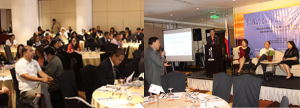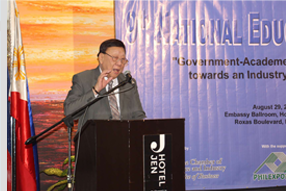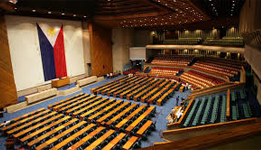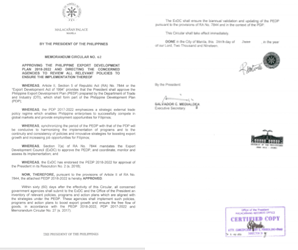 The 9th National Education Forum (NEF) was held last 29 August 2019 at Hotel Jen, Pasay City. Attended by distinguished speakers and panelists from the government, academe, and industry, the forum discussed the impact of the Fourth Industrial Revolution (4IR) in business, work and our daily lives as well as offer solutions and insights on how to go about meeting the challenges imposed by this technological transformation.
The 9th National Education Forum (NEF) was held last 29 August 2019 at Hotel Jen, Pasay City. Attended by distinguished speakers and panelists from the government, academe, and industry, the forum discussed the impact of the Fourth Industrial Revolution (4IR) in business, work and our daily lives as well as offer solutions and insights on how to go about meeting the challenges imposed by this technological transformation.
 The speakers and panelists alike discussed the pros and cons of the 4IR. Ms. Riza Mantaring of the Management Association of the Philippines (MAP) discussed the wonders of the hologram technology- an image that appears to be three dimensional and can be seen with a naked eye. As an advanced technology, holograms can also perform operations and surgeries outside operating rooms in any country.
The speakers and panelists alike discussed the pros and cons of the 4IR. Ms. Riza Mantaring of the Management Association of the Philippines (MAP) discussed the wonders of the hologram technology- an image that appears to be three dimensional and can be seen with a naked eye. As an advanced technology, holograms can also perform operations and surgeries outside operating rooms in any country.
Dr. Eduardo Ong of PCCI discussed the creation of a global village through social media revolution embodied by Facebook, Twitter and others that has given everyone a voice and a way to communicate instantly across the world. Such innovations can bring access to products and services to entirely new markets and can give people more opportunities to learn and earn in new ways.
Other speakers showed that digital technology can free workers from automation tasks, freeing them to concentrate on addressing more complex business issues and giving them more autonomy. It can also provide workers with new tools and insights to design more creative solutions to previously insurmountable problems.
Of the negative effects of such industrial transformation, the speakers and panelists agreed that being always connected can turn into a liability, with no respite from the continuous overload of data and connections. Dr. Marvin Adolfo of PMAP pointed out, “human beings will become lazy and live a distanced life through screens, while ignoring the world in fr ont of them. Relations will lose value as most of us now have become busy on our social media life and there is now the prevalence of fake news, voice and facial reorganization, etc, which are regarded as ethical concerns. Further, there are risks of machines overpowering humans as portrayed in movies such as Terminator and I Robot.”
ont of them. Relations will lose value as most of us now have become busy on our social media life and there is now the prevalence of fake news, voice and facial reorganization, etc, which are regarded as ethical concerns. Further, there are risks of machines overpowering humans as portrayed in movies such as Terminator and I Robot.”
However, there are ways forward in dealing with the negative effects of the 4IR. Our government should take steps to ensure that we are able to capitalize on the 4IR rather than the receiving end of it. Hence, collaborative effort like the government-academe-industry linkages is very critical. First and foremost, we need to improve the quality of education and training in order to create more skilled persons which automatically reduce the risk of losing jobs. Government also needs to focus on increasing markets from priority sectors in order to increase the country’s economy.
Thus, the forum concludes that as a country, we need to shape a future that works for all of us by putting people first and empowering them. In its most pessimistic, dehumanized form, the 4IR may have the potential to “robotize” humanity and thus deprive us of our heart and soul. But we, as human beings can complement it through the best parts of human nature- that is- creativity, empathy and stewardship or teaching or coaching- which separates us from the “robotic stance” and uplift humanity into a new collective and moral consciousness based on a shared sense of values and destiny. It is incumbent for us as humans to make sure the latter prevails.- GTM

 The Department of Trade and Industry-Export Marketing Bureau (DTI-EMB), Export Development Council (EDC) and the Philippine Exporters Confederation, Inc. (PHILEXPORT) cordially invites all exporters, Small and Medium Enterprises, Academe, International Organizations and relevant stakeholders to save the date and participate in this year’s National Export Congress (NEC) 2019 on 06 December 2019, 8:00 -4:00 PM at the Philippine International Convention Center, CCP Complex, Pasay City, with the theme “DRIVING EXPORTS THROUGH DIGITAL TRANSFORMATION”.
The Department of Trade and Industry-Export Marketing Bureau (DTI-EMB), Export Development Council (EDC) and the Philippine Exporters Confederation, Inc. (PHILEXPORT) cordially invites all exporters, Small and Medium Enterprises, Academe, International Organizations and relevant stakeholders to save the date and participate in this year’s National Export Congress (NEC) 2019 on 06 December 2019, 8:00 -4:00 PM at the Philippine International Convention Center, CCP Complex, Pasay City, with the theme “DRIVING EXPORTS THROUGH DIGITAL TRANSFORMATION”. The Export Development Council (EDC) in partnership with the Tourism Infrastructure and Enterprise Zone Authority (TIEZA) continuously supports Philippine Exporters by giving travel tax exemption incentives through Executive Order (EO) 589 for the past 12 years.
The Export Development Council (EDC) in partnership with the Tourism Infrastructure and Enterprise Zone Authority (TIEZA) continuously supports Philippine Exporters by giving travel tax exemption incentives through Executive Order (EO) 589 for the past 12 years.
 The 9th National Education Forum (NEF) was held last 29 August 2019 at Hotel Jen, Pasay City. Attended by distinguished speakers and panelists from the government, academe, and industry, the forum discussed the impact of the Fourth Industrial Revolution (4IR) in business, work and our daily lives as well as offer solutions and insights on how to go about meeting the challenges imposed by this technological transformation.
The 9th National Education Forum (NEF) was held last 29 August 2019 at Hotel Jen, Pasay City. Attended by distinguished speakers and panelists from the government, academe, and industry, the forum discussed the impact of the Fourth Industrial Revolution (4IR) in business, work and our daily lives as well as offer solutions and insights on how to go about meeting the challenges imposed by this technological transformation. The speakers and panelists alike discussed the pros and cons of the 4IR. Ms. Riza Mantaring of the Management Association of the Philippines (MAP) discussed the wonders of the hologram technology- an image that appears to be three dimensional and can be seen with a naked eye. As an advanced technology, holograms can also perform operations and surgeries outside operating rooms in any country.
The speakers and panelists alike discussed the pros and cons of the 4IR. Ms. Riza Mantaring of the Management Association of the Philippines (MAP) discussed the wonders of the hologram technology- an image that appears to be three dimensional and can be seen with a naked eye. As an advanced technology, holograms can also perform operations and surgeries outside operating rooms in any country. ont of them. Relations will lose value as most of us now have become busy on our social media life and there is now the prevalence of fake news, voice and facial reorganization, etc, which are regarded as ethical concerns. Further, there are risks of machines overpowering humans as portrayed in movies such as Terminator and I Robot.”
ont of them. Relations will lose value as most of us now have become busy on our social media life and there is now the prevalence of fake news, voice and facial reorganization, etc, which are regarded as ethical concerns. Further, there are risks of machines overpowering humans as portrayed in movies such as Terminator and I Robot.” PHILEXPORT President, Mr. Ortiz-Luis, emphasized the importance of “government officials, educational institutions, business leaders, and policymakers in pushing forward advocacies on education such as 4.0 workforce readiness, strengthening government-academe-industry linkages as well as best practices on multi-skilling workforce and plotting the ways forward in future-proofing work in the Philippines.”
PHILEXPORT President, Mr. Ortiz-Luis, emphasized the importance of “government officials, educational institutions, business leaders, and policymakers in pushing forward advocacies on education such as 4.0 workforce readiness, strengthening government-academe-industry linkages as well as best practices on multi-skilling workforce and plotting the ways forward in future-proofing work in the Philippines.” Commerce and Industry (PCCI), the Export Development Council (EDC), PHILEXPORT and the Employers Confederation of the Philippines (ECOP) are all working on policies towards identifying the breadth of jobs that are likely to be threatened by this technological advancement. Noting for example is the rapid progress in Artificial Intelligence (AI), which indicates a much broader range of jobs than previously thought could be carried out by machines. Therefore, the Commission on Higher Education and other government agencies shall make sure that essential policies shall bring up symmetrical balance so that we will not be worried about automation affecting employment in the country.”
Commerce and Industry (PCCI), the Export Development Council (EDC), PHILEXPORT and the Employers Confederation of the Philippines (ECOP) are all working on policies towards identifying the breadth of jobs that are likely to be threatened by this technological advancement. Noting for example is the rapid progress in Artificial Intelligence (AI), which indicates a much broader range of jobs than previously thought could be carried out by machines. Therefore, the Commission on Higher Education and other government agencies shall make sure that essential policies shall bring up symmetrical balance so that we will not be worried about automation affecting employment in the country.” The President of Multimodal and Logistics Association Inc. (PMTLAI) Ms. Marilyn C. Alberto, reported during the 2nd Logistics Services Philippines Conference and Exhibition (LSPH) that the issuance of the Joint Administrative Order (JAO) which focuses to address the problems on high shipping cost and port congestion will be the “long term solutions to the problems that affects the logistics services ability to enable business competitiveness.”
The President of Multimodal and Logistics Association Inc. (PMTLAI) Ms. Marilyn C. Alberto, reported during the 2nd Logistics Services Philippines Conference and Exhibition (LSPH) that the issuance of the Joint Administrative Order (JAO) which focuses to address the problems on high shipping cost and port congestion will be the “long term solutions to the problems that affects the logistics services ability to enable business competitiveness.” The Export Development Council (EDC) through its Networking Committee on Legislative Advocacy and Monitoring (NCLAM) has prioritized the export sector’s legislative agenda for the 18thCongress to have a more competitive export industry.
The Export Development Council (EDC) through its Networking Committee on Legislative Advocacy and Monitoring (NCLAM) has prioritized the export sector’s legislative agenda for the 18thCongress to have a more competitive export industry. In a Presidential Memorandum Circular (MC) No. 62 approving the Philippine Export Development Plan (PEDP) 2018-2022, concerned government agencies are mandated to implement their respective programs, activities and projects (PAPs) relevant to the PEDP.
In a Presidential Memorandum Circular (MC) No. 62 approving the Philippine Export Development Plan (PEDP) 2018-2022, concerned government agencies are mandated to implement their respective programs, activities and projects (PAPs) relevant to the PEDP.